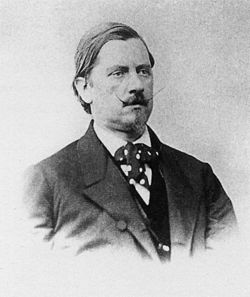I’m proud of my Hungarian heritage, and I’m proud of my gay heritage.
So when I read the White Crane Institute’s February 28th Gay Wisdom for Daily Living, my jaw dropped, I scrolled up and down my iPhone screen, ridiculously captivated and–eventually–grinning ear-to-ear.
Who knew that a 19th century Hungarian was a pioneer for gay rights? I love it, and I’m posting the article more-or-less in its entirety.
Gay Wisdom for Daily Living is an amazing newsgroup for gay history junkies. You can sign up for it here, and you’ll receive an e-mail every day with several short biographies of influential LGBT’s who were born, died or did something exceptional on that date. The obscure ones are my favorites, and there’s often archived poetry, diary entries, etc. in the daily posts.
Egészségetekre!
Karl-Maria Kertbeny

824 – on this date Karl-Maria Kertbeny or Károly Mária Kertbeny (born Karl-Maria Benkert) (d. 1882) was born in Vienna, the son of a writer and painter. He was an Austrian-born Hungarian journalist, memoirist and human rights campaigner who coined the word homosexual. The Benkert family moved to Budapest when he was a child — he was equally at home in Austria, Germany and Hungary.
As a young man, while working as a bookseller’s apprentice, Benkert had a close friend who was homosexual. This young man killed himself after being blackmailed by an extortionist. Benkert later recalled that it was this tragic episode which led him to take a close interest in the subject of homosexuality, following what he called his “instinctive drive to take issue with every injustice.”
After a stint in the Hungarian army, Benkert made a living as a journalist and travel writer, and wrote at least twenty-five books on various subjects. In 1847, he legally changed his name from Benkert to Karl-Maria Kertbeny (or Károly Mária Kertbeny), a Hungarian name with aristocratic associations. He settled in Berlin in 1868, still unmarried at 44. He claimed in his writings to be “normally sexed,” and there is no direct evidence to contradict this, despite the skepticism of subsequent writers.
Nevertheless, from this time on he began to write extensively on the issue of homosexuality, motivated, he said, by an “anthropological interest” combined with a sense of justice and a concern for the “rights of man.”
In his pamphlets, Kertbeny argued that the Prussian sodomy law, Paragraph 143 (which later became Paragraph 175 of the penal code of the German Empire), violated the “rights of man.” He advanced the classic liberal argument that consensual sexual acts in private should not be subject to criminal law. Recalling his young friend, he argued strongly that the Prussian law allowed blackmailers to extort money from homosexuals and often drove them to suicide.
Kertbeny also put forward the view that homosexuality was inborn and unchangeable, an argument which would later be called the “medical model” of homosexuality. This contradicted the dominant view up to that time, that men committed “sodomy” out of mere wickedness. Homosexual men, he said, were not by nature effeminate, and he pointed out that many of the great heroes of history were homosexual. With Heinrich Hössli and Karl Heinrich Ulrichs, he was among the first writers to put these now-familiar arguments before the public.
During 1869, in the course of these writings, Kertbeny coined the word “homosexual” as part of his system for the classification of sexual types, as a replacement for the pejorative terms “sodomite” and “pederast” that were used in the German- and French-speaking world of his time. In addition, he called the attraction between men and women “heterosexualism”, masturbators “monosexualists”, and practitioners of anal intercourse “pygists.”
After publishing his two important pamphlets, Kertbeny faded from the scene. If he was homosexual, he was never prepared to say so. In 1880, he contributed a chapter on homosexuality to Gustav Jäger’s book Discovery of the Soul, but Jäger’s publisher decided it was too controversial and omitted it. Nevertheless, Jäger used Kertbeny’s terminology elsewhere in the book.
Kertbeny did not live to see the wide acceptance of his terminology or his ideas. He died in Budapest in 1882 at age 58.
His gravesite was traced in 2001 by sociologist Judit Takács who conducted extensive research on his life. It is located in Kerepesi Cemetery in Budapest, the final resting place of numerous prominent Hungarians of the nineteenth and twentieth centuries. The Gay community set a new tombstone on it, and since 2002 it has been a recurring event at Hungarian Gay festivals to place a wreath at his grave.

Gwiz I only heard about him from a kinsey film